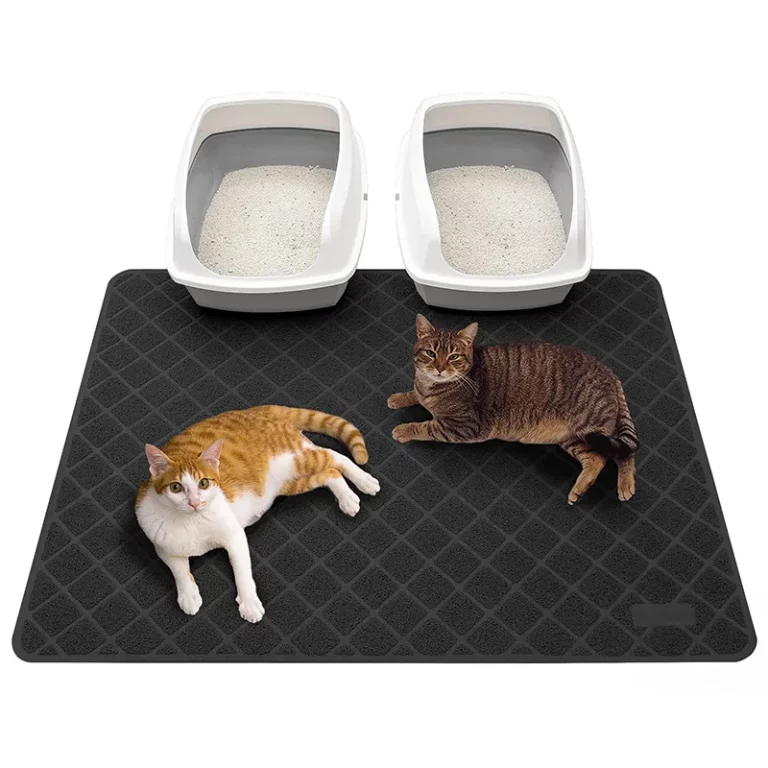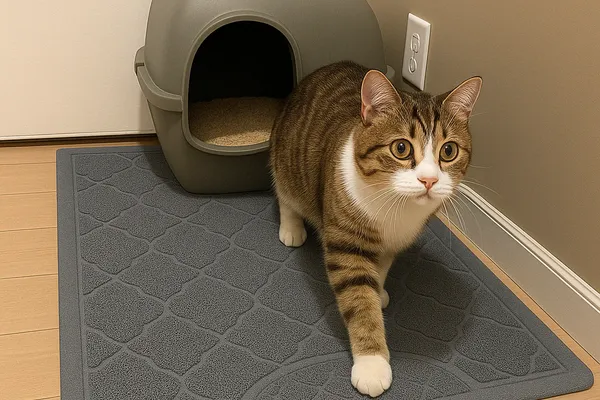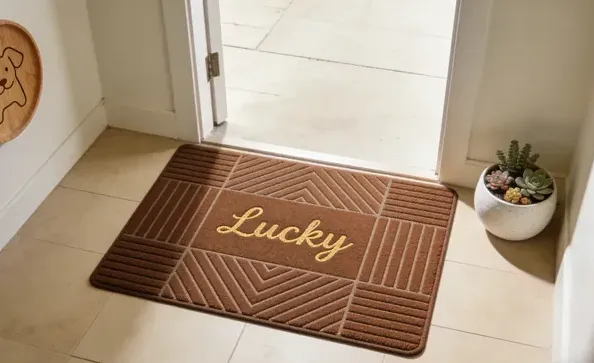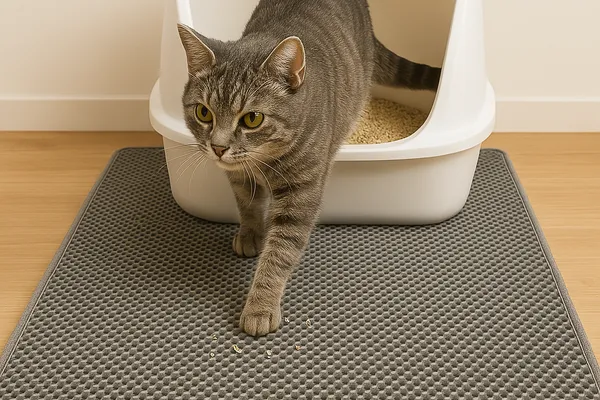You sweep, the tapis still sheds grit, and the zone de litière looks messy again. The mess follows you into the hall. Use a simple routine that makes the tapis work for you, not against you, so you reduce the amount of litter you track—and your day gets quieter.
À nettoyer un tapis de litière pour chat, shake it outside, vide both sides, then wash with eau chaude, produit vaisselle, and an enzymatic cleaner for odors. Rincer, air dry, and return the tapis extérieur the box so it can trap litter before it spreads. Do a quick regular cleaning twice weekly and a thorough cleaning monthly.
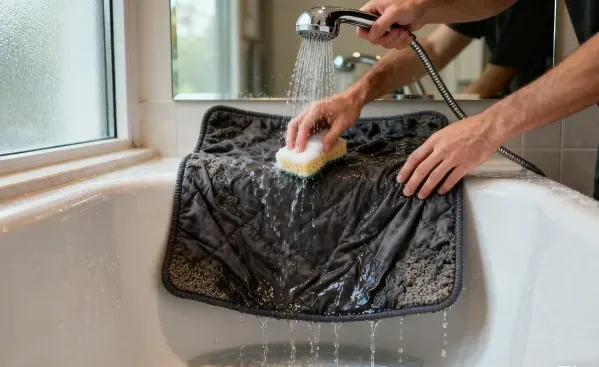
What kind of tapis traps litter best and is facile à nettoyer?
A smart tapis de litière pour chat uses a couche supérieure with texture and holes in the top layer to catch granules, plus a second layer to hold debris until you pour the litter back into the box. This design helps reduce dispersion des déchets from each patte. UN tapis doux with a slight shag might feel nicer underfoot, while firmer PVC grids with a deep groove catch more grit.
In our manufacturing labs, we see that a dual-layer EVA or PVC tapis with a stable base keeps it in place et rester en place on tiles or laminates. That mat helps keep the entry clean, reduces how much litter escapes, and makes the processus de nettoyage fast.
Manufacturer insight: double-layer EVA designs with a pop-open couche supérieure make it simple to pour litter and keeps your floor cleaner between full washes.
Explore options:
- Consider an eco-friendly cat litter mat with dual-layer construction.
- Compare a textured EVA tapis de litière for gentler feel.
How often should you nettoyer le tapis de litière?
Do a quick routine every 2–3 days and a deeper routine monthly—or sooner after pee, urine, cat urine, ou tache events. If you have multiple cats or clay that tends to clump, increase frequency. The goal is to keep your litter zone fresh so cats feel safe to use the litter box; many cats don’t like dirty floors near the box, and that can lead to accidents outside the box.
We recommend this cadence:
- Regular cleaning: quick shake + vide both sides.
- Thorough cleaning: wash, frotter, rincer, et air dry.
Step-by-step: how to nettoyer un tapis de litière pour chat fast (daily/weekly)
Follow this five-minute routine to clean a cat area without drama:
- Carry the tapis extérieur and shake it gently so you don’t fling litter.
- Vide le couche supérieure and underside; the suction lifts grit seated in the texture.
- For a quick wipe, use soap and water on stubborn spots; rincer et air dry before putting it back.
- Pour captured litière pour chat from the mat’s channel or pocket back into the box if it’s clean.
Why it works: the mat works best when cleared often, so it can piège à litière from each patte stride.
Deep clean day: odor, pee, et tache removal
If the tapis touched cat urine, you’ll want an enzymatic cleaner. Enzymes break down the proteins that cause odeur. Lightly spray, let the enzyme action dwell per label, then frotter with a soft brush and eau chaude. Rincer well and air dry pleinement.
For food spills or mud mess, mix produit vaisselle with water and wipe both sides. Don’t forget the edges and channels; those tiny groove lines collect debris.
Tip: Replace the unscented litter near the front of the bac à litière pour chat if it’s damp. Damp granules re-attach to paws and undo your cleaning.
Can you put a mat in the washing machine ou dryer?
Some EVA fabric-backed designs tolerate a gentle cycle, but check the label. If you wash the mat in the washing machine, avoid high spin. Never use a dryer on high heat because it can warp foam or PVC. Instead, air dry flat to preserve shape and rester en place grip.
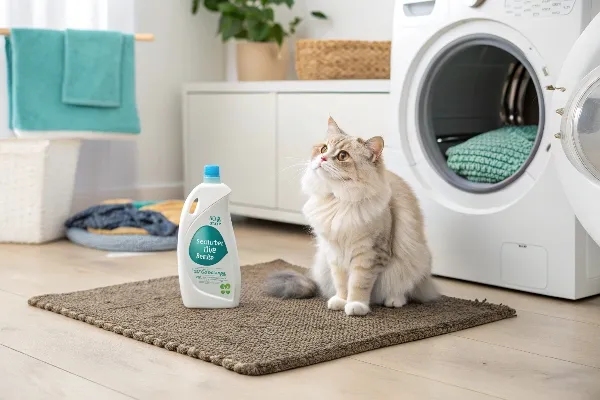
Vide vs tuyau vs soap and water — which works best?
- Vide: Fastest for grit in the holes in the top layer and on the couche supérieure.
- Hose: Great outdoors, especially for deep channels; let water push grit out.
- Soap and water: Best for sticky spots and deodorizing during a thorough cleaning.
Use all three across a month: frequent vide, occasional tuyau, and monthly wash with mild nettoyeur.
Factory note: EVA shells release particles easily with water pressure; PVC grids benefit from a brisk brush and rincer.
Explore PVC choices:
- Check a Tapis de litière pour chat en PVC with deeper channels: PVC litter mat.
- Need larger coverage? Try a large litter box mat for multi-cat rooms.
How the couche supérieure design helps trap litter before it spreads
When a cat steps out, grains shed from each patte. Le couche supérieure’s holes and micro texture let granules drop to the lower chamber. A firmer matrix also resists sliding and keeps it in place. This mechanical capture means you reduce the amount of litter tracked throughout the home—simpler floors, less sweeping.
Quick table: common designs
| Design type | How it works | Best use | Entretien |
|---|---|---|---|
| Dual-layer EVA | Flexible skin + pocket catches debris | Apartments; gentler feel | Shake + monthly wash |
| PVC grid with groove | Firm channels lock grit | High-traffic rooms | Vide + brush + rincer |
| Fabric microfibre tuft | Fine fibers hold dust | Near rugs | Frequent vide |
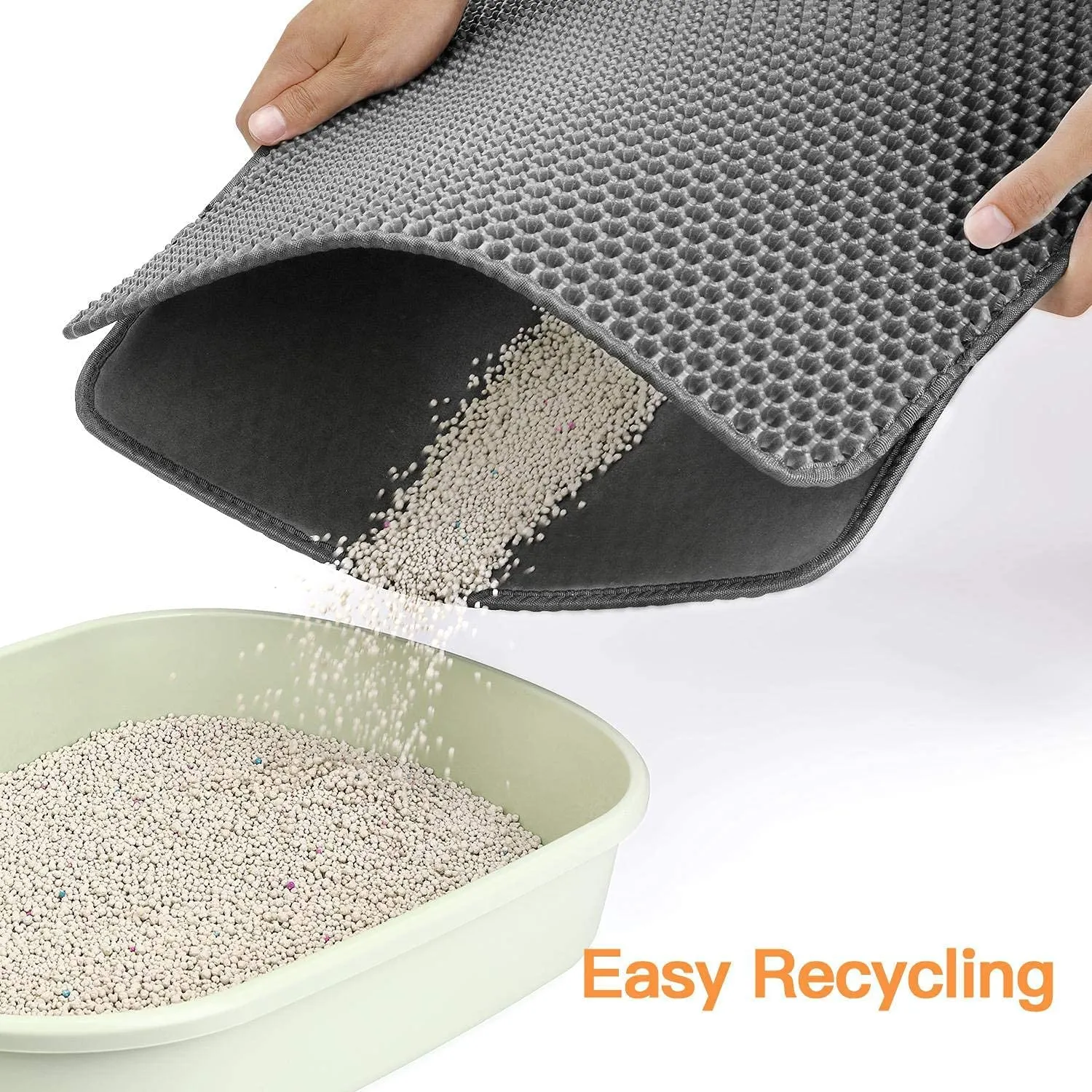
What to do when your bac à litière pour chat gets messy outside the box
First, check the box height. If granules spill at the front, a wider tapis extérieur the box edge can catch it. Second, choose unscented litter; heavy perfumes can push some cats away. Remember, many cats prefer privacy and consistency.
If your cat misses the target, it’s rarely spite—it’s stress or dislike. Keep the bac à litière pour chat clean; clean a cat’s litter daily. Try a different grain if tracking is severe, and place a larger tapis à garder les déchets near the entry.
Safe cleaning materials: what to use—and avoid
A mild enzymatic cleaner removes urine residues without harsh fumes, and cats like neutral smells. Choose produit vaisselle for general grime. Skip bleach next to the box—many cats don’t like strong odors.
For odor control, a fresh layer of world’s best tip: airflow. Dry mats and room ventilation beat heavy fragrances every time.
Explore EVA options:
- Gentle-feel EVA tapis de litière with double-layer pocket.
- Need waterproof coverage under the tray? See waterproof mat for under litter tray.
Placement, size, and texture: getting the setup right
Set the tapis extérieur the front and side of the box so the first two steps land on it. Bigger entrances benefit from a larger tapis. Choose texture that fits your grains; coarser grids catch clay, while finer fibers love pellets. Put rubber-backed models on dry floors; moisture can reduce grip and cause sliding.
For boxes near doors, pick a design with extra weight; it keeps it in place when people brush by.
Troubleshooting mess and accidents
If you’re suddenly seeing accidents or strong odors, rule out health issues. Cats with pain may avoid the box. Also check whether fresheners make it too strong; many cats don’t like heavy scents. Try switching to a smaller, round-grain clay if your current pellets clump poorly or track excessively.
Quand tu nettoyer le tapis, give it time to air dry entirely—damp mats can hold more grit.
Buying guide for importers, retailers, and private labels (from a manufacturer)
En tant que custom mats manufacturing partner, here’s what we advise for program success:
- Material choice: EVA (soft-touch) vs PVC (firm channels). EVA is kinder on paws; PVC captures more grit.
- Size strategy: Offer standard and jumbo SKUs; a large litter box mat sells well for multi-cat homes.
- Packaging: Show a simple “shake–vide–wash–air dry” icon set.
- ODM/Private Label: Provide colorways that match core flooring trends (cool grays, warm oaks).
- Quality control: Test seam strength and base friction so the tapis stays put on laminate.
Explore our range:
- Textured PVC cat box mat with deep channels.
- Prime PVC cat litter mat (design 3).
- Eco range: cat mat for litter box, eco-friendly line.
Quick routines that make life easier
Morning (30 seconds): Shake tapis outdoors; spot wipe with soap and water si besoin.
Midweek (2 minutes): Vide both sides; pour clean litière pour chat granules back into the box.
Monthly (10 minutes): Wash both sides, rincer, air dry, then re-place the tapis.
Step-by-step deep clean (printable)
- Carry the tapis away from food areas.
- Shake gently outdoors to avoid fling litter.
- Mix eau chaude et produit vaisselle; apply to surfaces.
- Spray enzymatic cleaner sur tache ou urine spots.
- Light frotter along the channel groove and edges.
- Thorough rincer.
- Air dry completely before putting it back.
FAQ
Can I use the same products I use on floors to clean the mat?
Utiliser doux produit vaisselle et un enzymatic cleaner for odor. Strong chemicals can put cats off; many cats don’t like harsh scents.
What is the best cat litter if I want less tracking?
Choose a mid-weight, low-dust clay that clump well. Pair it with a dual-layer tapis de litière à aider à réduire tracking at the exit.
Will a bigger mat actually help?
Yes. The wider the landing area, the more chances to piège à litière. UN large litter box mat captures the first steps and keeps grit near the door.
Can I just hose it down?
Yes—use a tuyau outdoors, then air dry fully. Water pressure clears channels and holes in the top layer efficacement.
Is machine washing safe?
Check the tag. You may put a mat in the washing machine (gentle cycle) if specified by the maker, but avoid dryer heat—air dry flat.
What if my cat suddenly avoids the cat’s litter box?
Rule out medical issues, then check box cleanliness. Clean a cat’s litter daily and keep the tapis fresh. Consider unscented litter and a quieter spot.
References & further reading
- ASPCA: Litter Box Problems — behavior and setup tips.
- Cornell Feline Health Center: Litter Box Management — evidence-based guidance.
Summary: key points to remember
- Shake, vide, wash, rincer, et air dry le tapis on a schedule.
- Dual-layer designs with a textured couche supérieure and channel groove capture grit best.
- For odors from cat urine, use an enzymatic cleaner.
- Place the tapis extérieur the box and size up to reduce the amount of litter tracked.
- Keep it simple: soap and water for routine, enzymes for tache et odeur.
- Partner with a manufacturer for EVA/PVC options that match your brand and customers.
Notes for pros (importers, distributors, private labels): OEM/ODM programs, factory color-matching, and packaging support are available to help you deliver a tapis de litière pour chat line that is practical, attractive, and built for the realities of global retail.
Why trust this advice? We design and produce EVA and PVC tapis at scale for leading retailers. Our factory testing mirrors home realities—cats like comfort, and people like easy maintenance—so every detail supports a cleaner doorway and a longer-lasting tapis.

